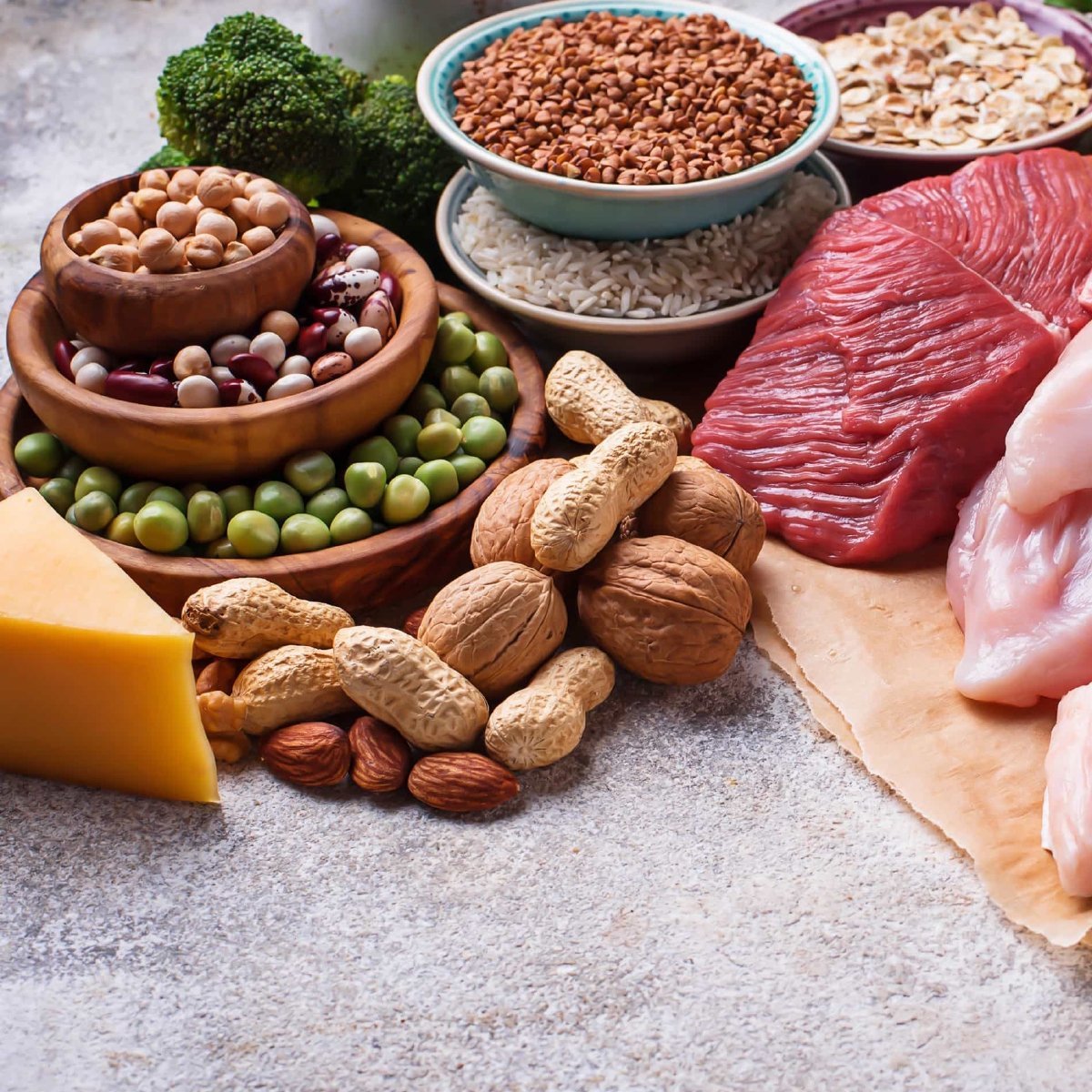Dangling his furry ears like a pair of fluffy antennae, Bailey, the eager Labrador retriever, wags his tail impatiently, yearning for his well-deserved treat. With a quick command, his owner tosses a snack that Bailey snatches, gulping it down with exceptional gusto. While it may seem like a simple reward for good behavior, this tasty morsel plays a far greater role in the intricate world of dog training. Protein, the almighty substance fueling canine vitality, holds the key to unlocking the potential of our four-legged friends. In this captivating exploration, we delve into the essential role of protein in dog training, revealing the fascinating secrets that lie beneath the surface of this seemingly humble nutrient. Pack your bags and join us on an intriguing journey through the captivating realm of our furry companions.
Table of Contents
- Understanding the Importance of Protein in Dog Training
- Protein-Rich Diet: Key to Optimal Performance and Behavior
- The Impact of Protein on Canine Cognitive Function and Training Success
- Protein Sources: Choosing the Best Options for Your Dog
- Balancing Protein Intake: Guidelines for Effective Training Regimens
- Q&A
- Concluding Remarks

Understanding the Importance of Protein in Dog Training
When it comes to training your furry companion, protein plays a vital role in achieving success. Just like us, dogs require adequate protein in their diet to support their growth, development, and overall well-being. Protein is not only crucial for the formation of strong muscles but also for the repair and maintenance of body tissues.
By incorporating protein-rich foods into your dog’s diet, you provide them with the essential amino acids necessary for their body’s various functions. These amino acids are the building blocks of protein and are responsible for promoting healthy enzyme and hormone production, ensuring proper digestion, and boosting their immune system.
Some protein-rich options to include in your dog’s diet include lean meats like chicken, beef, and turkey; fish such as salmon and tuna; dairy products like plain yogurt and cottage cheese; and plant-based sources like lentils and quinoa. Remember to consult with your veterinarian to determine your dog’s specific protein requirements based on their age, size, and activity level.

Protein-Rich Diet: Key to Optimal Performance and Behavior
When it comes to achieving optimal performance and behavior, a protein-rich diet can make a significant difference. Proteins are the building blocks of our body, responsible for repairing tissues, supporting muscle growth, and maintaining overall health. Including an adequate amount of protein in your diet can provide numerous benefits for both your physical and mental well-being.
First and foremost, protein plays a vital role in enhancing performance. Whether you are an athlete, a fitness enthusiast, or simply someone looking to improve their daily activities, protein helps to repair and strengthen muscles, allowing you to perform at your best. Consuming protein before and after workouts aids in muscle recovery, reducing the risk of injuries and enhancing your endurance.
Furthermore, protein is essential for maintaining stable behavior and mental focus. It provides a steady release of energy, keeping you energized throughout the day and preventing crashes. The amino acids found in protein also play a crucial role in the production of neurotransmitters, chemicals that transmit signals in the brain, improving cognitive function, concentration, and mood stability.
Here are a few key benefits of a protein-rich diet:
- Lean muscle development: Protein supports muscle growth and repair, helping you build and maintain lean muscle mass.
- Weight management: Protein-rich foods provide a feeling of satiety, reducing cravings and helping to manage weight.
- Improved metabolism: Protein requires more energy to digest, boosting your metabolism and aiding in weight loss and maintenance.
- Strong immune system: Protein is essential for the production of antibodies, which play a critical role in maintaining a strong immune system.
Remember, it’s important to choose high-quality protein sources such as lean meats, fish, poultry, eggs, dairy products, legumes, and nuts. Combining these protein-rich foods with a well-balanced diet and regular exercise will not only optimize your performance but also lead to a healthier and more fulfilling lifestyle.

The Impact of Protein on Canine Cognitive Function and Training Success
When it comes to our canine companions, it’s no secret that protein plays a crucial role in their overall health and well-being. But did you know that it also has a significant impact on their cognitive function and training success? Let’s delve deeper into this fascinating subject and uncover the incredible benefits of protein for our furry friends.
Cognitive Function:
- Improved Memory: Protein is essential for the proper functioning of neurotransmitters, which are responsible for transmitting signals in the brain. By ensuring an adequate intake of protein, we can enhance our canine’s memory and cognitive abilities.
- Sharpened Focus: Protein is a building block for enzymes that are involved in various brain functions. A protein-rich diet ensures optimal brain function, leading to improved focus and concentration during training sessions.
- Mental Agility: Studies have shown that protein-rich diets can promote mental agility in dogs, allowing them to think faster and solve problems more efficiently. This mental agility translates into better training outcomes and quicker learning.
Training Success:
- Increased Motivation: Protein provides the necessary energy dogs need to engage in training sessions. With a high-protein diet, our canine friends feel more motivated and will be driven to perform to their best abilities.
- Enhanced Muscle Development: Protein is crucial for muscle growth and repair. Properly developed muscles are essential for athletic prowess and aid in achieving desired training results.
- Stronger Immune System: Protein supports a healthy immune system, providing dogs with the strength they need to endure rigorous training without succumbing to illness or fatigue.
As responsible pet owners and trainers, it is imperative that we prioritize our furry friends’ protein intake. By ensuring a balanced diet rich in high-quality protein sources, we can not only boost their cognitive function but also set them up for training success. Remember, a healthy dog is a happy and trainable dog!
Protein Sources: Choosing the Best Options for Your Dog
When it comes to the health of your furry friend, providing a balanced diet is essential. As a responsible dog owner, one of the crucial aspects to consider is the protein sources in your dog’s meals. Protein plays a vital role in maintaining your dog’s overall health and well-being, including building and repairing tissues, supporting a healthy immune system, and providing energy.
There are various protein sources available for your dog, but not all options are created equal. Here are some of the best protein sources that you can incorporate into your dog’s diet:
- Lean Meats: Opt for lean meats like chicken, turkey, and beef as they are protein-rich and contain essential amino acids necessary for your dog’s health.
- Fish: Fish is not only a great source of protein but also provides omega-3 fatty acids that promote a healthy coat and support cognitive function. Incorporate fish like salmon or sardines into your dog’s meals, ensuring they are boneless and cooked thoroughly.
- Dairy Products: While not suitable for all dogs due to lactose intolerance, dairy products like cottage cheese and plain yogurt can be a good source of protein if your dog can tolerate them. Always introduce dairy slowly and monitor for any adverse reactions.
- Legumes: Including beans, lentils, and peas in your dog’s diet can provide both protein and fiber. Ensure legumes are cooked well and can be easily digested by your pup.
Remember, consulting with your veterinarian is crucial to determine the best protein sources and portions suitable for your dog’s specific needs. Additionally, ensure to rotate protein sources regularly to provide a diverse nutrient profile and prevent dietary sensitivities.
Balancing Protein Intake: Guidelines for Effective Training Regimens
When it comes to achieving your fitness goals, maintaining a well-balanced protein intake is crucial. Protein not only aids in muscle growth and repair but also plays a vital role in supporting your overall health. To make the most of your training regimen, consider following these guidelines:
- Determine your protein needs: Each individual’s protein requirements may vary depending on factors such as age, weight, and activity level. Consulting with a nutritionist or dietitian can help you determine the ideal protein intake for your specific needs.
- Diversify your protein sources: While meat and dairy products are commonly associated with protein, it’s important to diversify your protein sources. Incorporating plant-based proteins like legumes, tofu, and quinoa can provide a variety of essential amino acids and additional nutrients.
- Timing is key: Distributing your protein intake throughout the day can optimize muscle protein synthesis. Aim to consume protein-rich meals or snacks within 1-2 hours pre- and post-workout to aid in muscle recovery and growth.
- Stay hydrated: Proper hydration is often overlooked but holds significant importance. Adequate water intake helps transport nutrients and supports digestion, making it necessary for efficient protein utilization.
By adhering to these protein balancing guidelines, you can ensure that your training regimen is optimized for maximum efficiency and results. Remember, consistency and balance are key when it comes to achieving your fitness goals and maintaining a healthy body.
Q&A
Q: Why is protein important in dog training?
A: Protein is essential for a dog’s overall health and plays a crucial role in muscle development and repair. During training, protein-rich diets provide the necessary energy for dogs to stay active and focused.
Q: What are the benefits of a high-protein diet for dogs during training?
A: High-protein diets support stamina, strength, and endurance in dogs, enabling them to perform at their best during training sessions. Additionally, protein aids in the production of neurotransmitters, promoting optimal brain function and enhanced learning capabilities.
Q: Can a lack of protein affect a dog’s ability to learn and retain skills?
A: Yes, a protein deficiency can impair a dog’s cognitive function, hindering their ability to concentrate and learn new behaviors. Insufficient protein intake may also lead to muscle weakness, making it harder for dogs to perform physical tasks required during training.
Q: How can I ensure my dog gets enough protein for effective training?
A: Feed your dog a balanced diet that includes high-quality sources of protein such as lean meats, fish, eggs, and legumes. Consult with a veterinarian to determine the appropriate protein intake based on your dog’s size, activity level, and training goals.
Q: Are there any risks associated with excessive protein consumption for training dogs?
A: While protein is vital, excessive amounts can strain a dog’s kidneys and liver. It is important to maintain a proper balance of nutrients in your dog’s diet and consult a veterinarian to determine the ideal protein intake for your specific dog training routine.
Q: Can protein supplements be beneficial for dog training?
A: In most cases, a well-balanced diet should provide enough protein for your dog’s training needs. However, in certain situations, such as intense athletic training, protein supplements may be recommended by a veterinarian to ensure optimal performance and recovery.
Concluding Remarks
As we wrap up this exploration into the realm of dog training and the indispensable role of protein, paws down, you are now well-versed in the knowledge that will take your furry friend’s skills to soaring heights. They say a dog is man’s best friend, but behind every exceptional four-legged companion, lies a diet enriched with the power of protein.
So, the next time you embark on a training adventure with your trusty tail-wagger, remember the crucial role that protein plays. From strengthening their muscles to fueling their boundless energy, protein becomes the compass that guides your pup towards a successful journey of learning and growth.
Whether they are hurdling through agility courses or delicately mastering obedience commands, protein serves as the knight in shining armor, ensuring their peak performance. It’s the secret ingredient that turns ordinary training sessions into extraordinary feats, where your pup emerges as the star of the show.
But let us not forget, amidst the clamor of training plans and speed drills, that our canine companions are an integral part of our lives. They fill our hearts with unwavering devotion and shower us with unconditional love. As diligent stewards of their well-being, it is our duty to provide them with the nourishment they need to thrive.
So go forth, brave trainers, armed with this newfound understanding of the power of protein. Empower your pups with nutritional prowess, celebrating each milestone achieved together. From wagging tails to joyous barks, your furry partner will forever be grateful for the love and care you’ve invested in their journey.
Remember, behind every well-trained dog is an unwavering bond, where the delectable taste of protein not only fuels their physical prowess but ignites the flame of companionship between human and canine. It’s time to set the wheels of training in motion, guided by the incomparable magic of protein. Together, let’s embark on a journey of pawsitive transformation and create memories that will last a lifetime.
As an affiliate, my content may feature links to products I personally use and recommend. By taking action, like subscribing or making a purchase, you’ll be supporting my work and fueling my taco cravings at the same time. Win-win, right?
Want to read more? Check out our Affiliate Disclosure page.